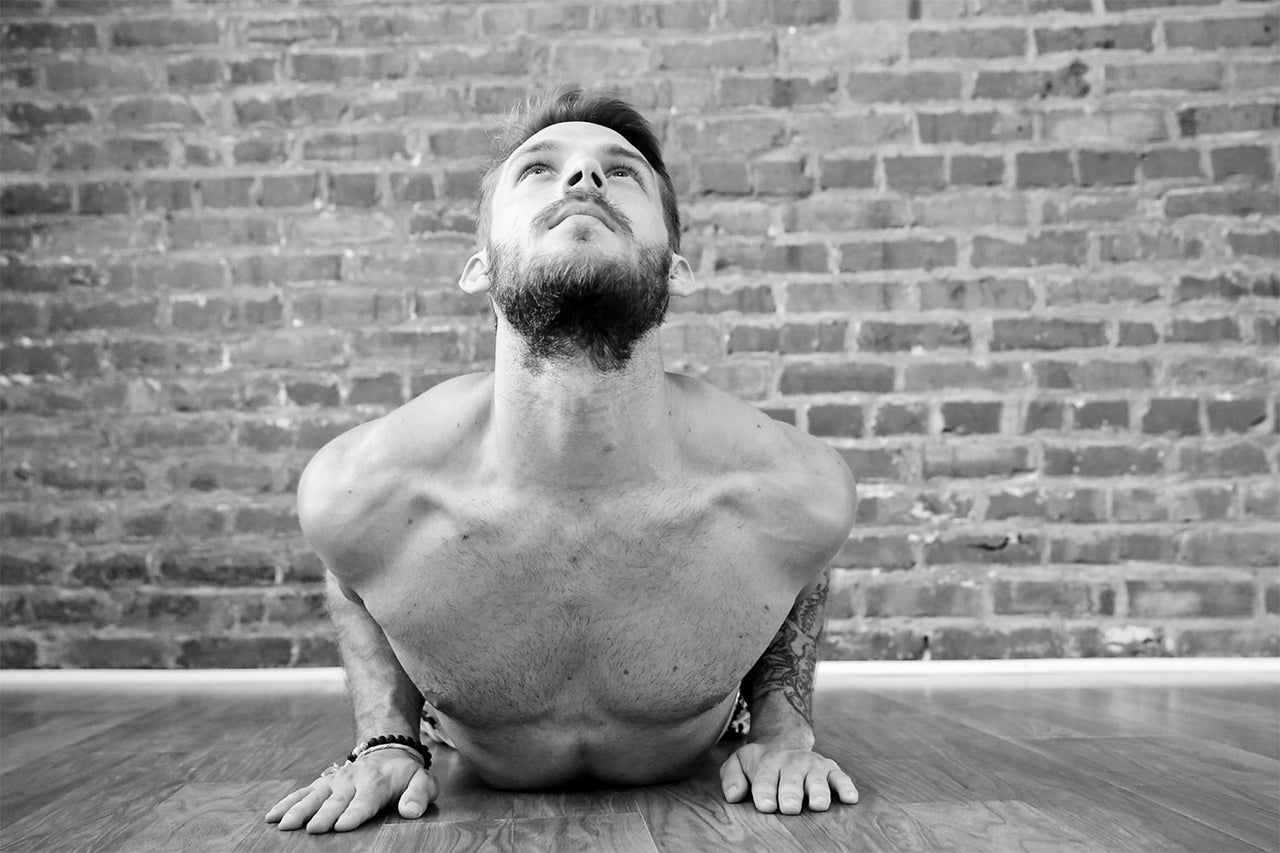By Laura Cergoll
As yoga studio owner and instructor Griffin Peddicord ’14 paces around the 105-degree room in hot pink swim trunks, guiding students through the 26 postures of a heated Bikram-style class, you would never guess that he runs a tech company on the side or that his entrepreneurship was recognized at the White House in May 2015. And you wouldn’t guess that before that, over the course of one year, he went from barely walking to winning the 2010 International Yoga Asana Championships.
Peddicord, owner of Redux Yoga at the corner of Spring and President streets in Charleston, suffered from multiple knee injuries before starting yoga. He struggled to walk during his junior year of high school in 2009. Doctors had diagnosed him with arthritis, a torn meniscus, Lyme disease, then fractured bone marrow.
“My leg could only bend about this much,” Peddicord said, inclining his shin half an inch.
At his friend’s urging, Peddicord took his first yoga class at a Bikram studio in his hometown of Baltimore. Immediately after class, he felt better and signed up for another month. After three weeks of constant practice, he had regained enough range of motion in his knee to walk. But the health benefits weren’t his only reason to keep going back.
“I was awful at it,” he said. “I was like, ‘I can’t be this bad at something.’”
At $160 a month, classes weren’t exactly in the budget of a 17-year-old student. So Peddicord started doing work-study at the studio to support his “yoga habit.” By his senior year, he was practicing three to four times every day. “I kind of have an obsessive personality,” he said. “I never really slept much. I would just get up and either do yoga or work before school, and then get out of school and go do yoga, then work, yoga, work.”
Peddicord skipped most of the social experiences of high school, but he saw yoga as something that would be more rewarding in the long run. His intense dedication paid off. Less than a year after his first class, his instructors asked him to compete. Peddicord hadn’t even been aware that yoga competitions existed, but he agreed to do it.
After winning at the state and regional levels, his instructors paid for his trip to Los Angeles for the 2010 International Yoga Asana Championships. Surrounded by people who had been practicing for years, Peddicord didn’t expect to do well. To his surprise, he won the youth division. At 17 years old, barely one year removed from being virtually crippled, he became a world champion yogi.
Immediately after the award ceremony, Peddicord sought out Bikram Choudhury, the founder of Bikram yoga. Fueled by the same “why not?” attitude that led him to compete in the first place, Peddicord asked if he could attend teacher training, which was usually restricted to people 21 or older. Choudhury agreed to admit Peddicord to the three-month training course in Las Vegas and offered to pay for his cost of attendance. Every day students had eight hours of yoga and eight hours of lecture followed by three to four hours of watching Mahabharat, a 1980s television adaptation of the ancient Sanskrit epic and spiritual text. Most students hated the long days and strict rules, but to Peddicord it was like summer camp.
Peddicord had pursued teacher training because he felt that it was what he was supposed to do after winning the world championships. However, he soon found that he truly enjoyed teaching. “People transform so much from their first class. They start to feel proud of their body, start to feel more fit. And they’re happier, and you see people whose pain goes away, and it’s just the most rewarding thing ever,” Peddicord said. “I fell into it, but it stuck.”
Peddicord had only a few criteria in his college search: a business program, a beach and a Bikram yoga studio. He picked the College of Charleston without ever visiting the campus and quickly found a job at Bikram Yoga Charleston. While working on his business major and a minor in leadership, change and social responsibility in the School of Business, Peddicord taught five to 10 classes per week at the Mount Pleasant and downtown studios. He often woke at 6 a.m. to teach yoga before class and left town during weekends to attend conferences.
In 2015, Peddicord quit teaching to focus on his tech company, the Ohana Syndicate. That May, he traveled to Washington, D.C., for President Barack Obama’s Global Entrepreneur Summit. He was recognized as an Emerging Global Entrepreneur at a White House ceremony for his music sharing app, Voyzik.
After the summit, Peddicord started entertaining the idea of opening his own yoga studio in Charleston. Bikram Yoga Charleston had closed shortly after Peddicord left, leaving the Spring Street studio empty. Applying his business acumen to yoga, he negotiated a lease for the building and opened Redux Yoga in April 2016.

Griffin Peddicord performs an asana in front of Bikram Choudhury and classmates during teacher training in 2010.
Redux offers the 26-posture beginner Bikram class, as well as flow, therapeutic and fusion classes open to students of all levels. The studio is heated for almost all of them. In addition to teaching every morning, Peddicord attends every class at Redux to “make sure they’re good.”
During Peddicord’s class, students stretch and fold into postures with the help of the heat and Peddicord’s coaching. In standing lotus, they cradle a foot against their opposite hip with one arm and hold the other up in half of a prayer pose. Sweat streams off their bent elbows like water from a slow-running tap. A few hold the posture steady; others fall out of it, shake it off and find their balance again.
Yoga is for everyone, Peddicord said, and teachers and fellow students aren’t there to judge anyone. “It’s rewarding when a student does well, but it’s also not about doing the postures, it’s about being in the room. You’re gonna have classes where you can’t do anything, where you have to sit down the whole time, but that’s your yoga for the day,” he said. “You came, you showed up and you did it, and you’ll feel better the next class.”
This article was written by Laura Cergol, a senior from Frederick, Maryland, studying communication and linguistics in the Honors College at the College of Charleston. She is also a William Aiken Fellow and a member of the Global Scholars program.






